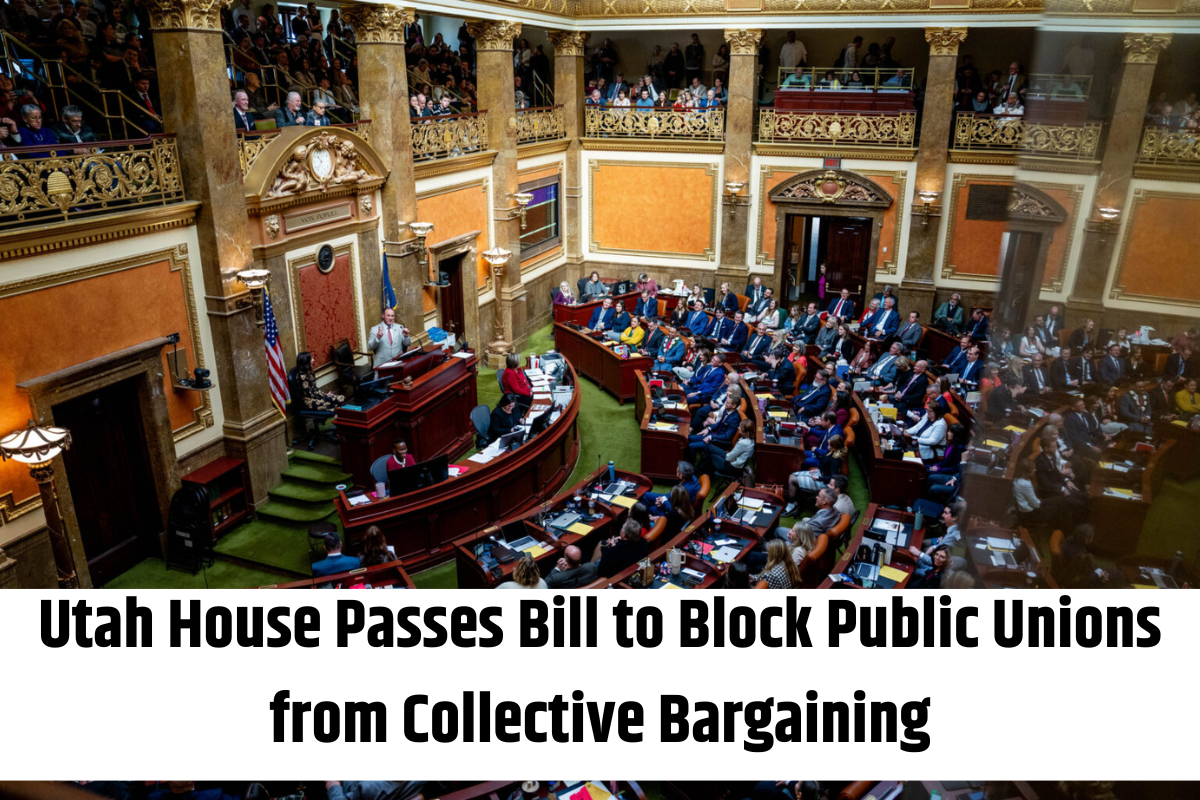
A contentious bill aimed at curtailing the collective bargaining power of public labor unions has passed the Utah House of Representatives, despite significant opposition from both Democrats and some Republicans. The bill, H.B. 267, would prevent public employers—such as school districts and other government agencies—from entering into collective bargaining agreements with public employees, including teachers and law enforcement officers.
The legislation, sponsored by Rep. Jordan Teuscher (R-South Jordan), also proposes banning the use of public funds to support labor unions and prohibiting union members from receiving state retirement benefits.
Teuscher defended the bill by arguing that allowing unions to represent a “sole voice” in bargaining doesn’t account for employees who disagree with the union’s actions or aren’t union members at all. He emphasized that while unions would still be able to advocate for their members, they would no longer be able to negotiate on issues like pay or benefits.
“In many government agencies with collective bargaining today, the union voice represents only a small minority of employees,” Teuscher said. “Thousands of voices across the state are not being heard in that process.”
Despite Teuscher’s arguments, the bill saw significant pushback from both sides of the aisle. The bill passed the House with a 42-32 vote, with several Republicans joining Democrats in opposing it.
Republican Lawmaker Voices Concerns
Rep. Doug Welton (R-Provo), a public school teacher, expressed concerns about the bill’s ability to truly represent teachers. While he agreed that public funds shouldn’t be used to pay for union activities like release time, he argued that the bill didn’t solve the core issue of teacher representation. Welton also pointed out that collective bargaining is already optional in Utah.
“I’m not convinced that this bill answers the issue of all teachers being represented,” Welton said, adding that most unions would fail to reach the threshold where individual teachers could voice their concerns.
Democrats Oppose the Bill
Rep. Jennifer Dailey-Provost (D-Salt Lake City) strongly opposed the bill, calling it “anti-worker, anti-family, and anti-Utah values.” She argued that the bill would create a culture of fear in workplaces, stifling the ability of workers to advocate for themselves collectively.
“We are undermining workers’ rights to organize and speak up together,” Dailey-Provost said, stressing that the bill would have a chilling effect on workers’ ability to negotiate for better conditions.
Also Read – Riverdale Mother, 27, Sentenced to Prison for Death of Her 2-Month-Old Baby
The Utah House Democratic Caucus echoed these sentiments in a statement, claiming the legislation contradicts Utah’s commitment to supporting its education professionals, public safety officers, and public service employees. They criticized the bill for weakening the power of unions to negotiate fair compensation and threatening the livelihoods of working families.
The Bill’s Path Forward
Following the Utah House vote, the bill will now be sent to a Senate committee for further consideration. If it passes the Senate, it will proceed to the Governor’s desk for approval.
The Utah Education Association (UEA), which represents educators across the state, has voiced strong opposition to the bill. In a statement, the UEA said it was “deeply disappointed” by the bill’s progress and warned that it sets a dangerous precedent by undermining the rights of public employees to organize and advocate for their interests.
“This bill attacks public educators who dedicate their lives to teaching Utah’s children, and it threatens the quality of public education across the state,” the UEA said, adding that the organization gathered nearly 13,000 petition signatures in just one week.
A Divided Debate
The bill’s passage in the House follows heated discussions in the Utah House Labor Committee, where members clashed over the role of unions in negotiating employee benefits, pay, and working conditions. The committee voted 11-4 in favor of advancing the bill, with many public commenters raising concerns about the impact on unionized workers.
As the bill moves forward, it continues to divide lawmakers and the public. Supporters of H.B. 267 argue that it will ensure a fairer representation of employees’ voices, while opponents warn that it will strip workers of their ability to collectively negotiate for fair wages and working conditions.
With the Senate vote on the horizon, the future of public labor unions in Utah remains uncertain.







